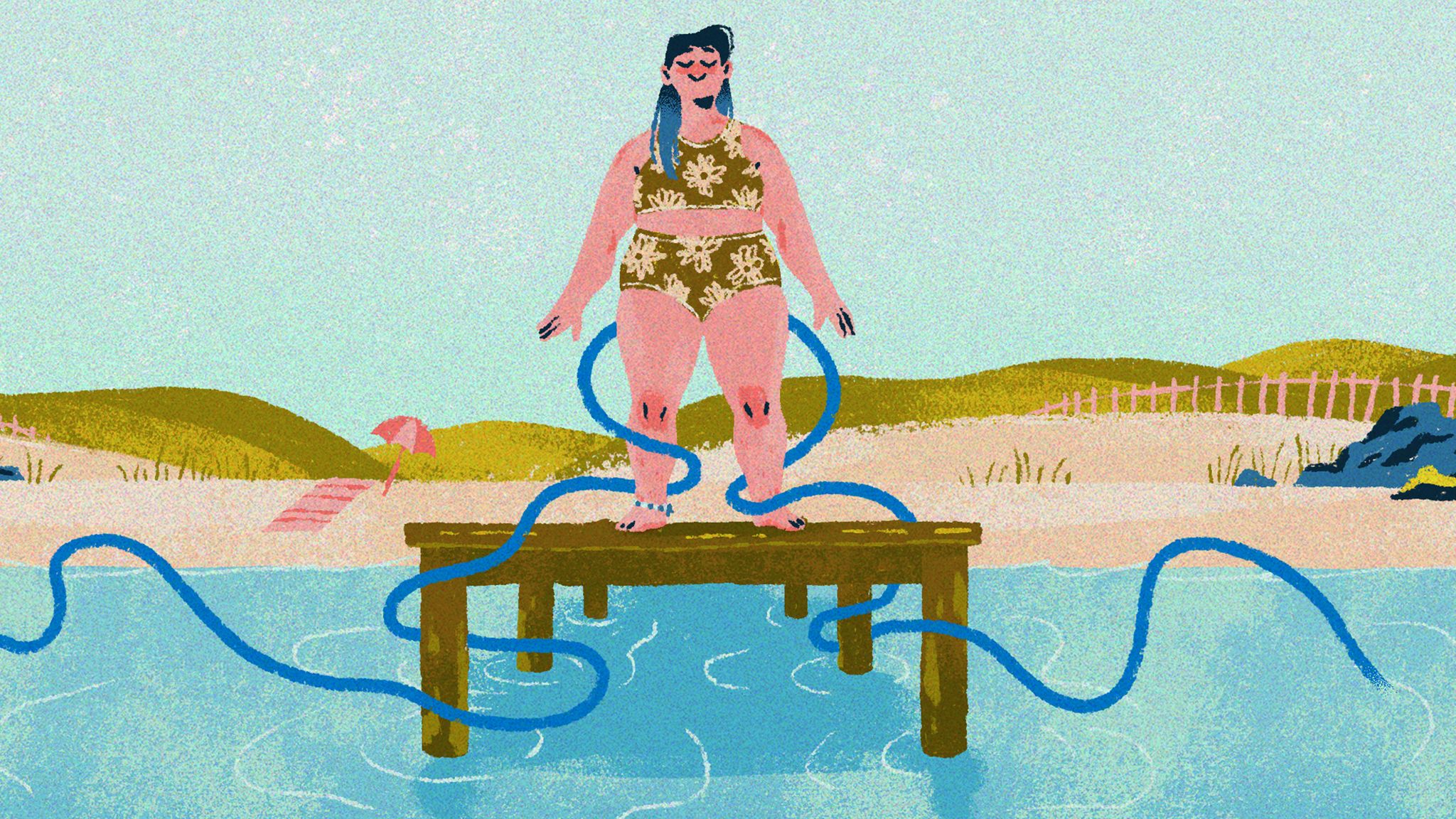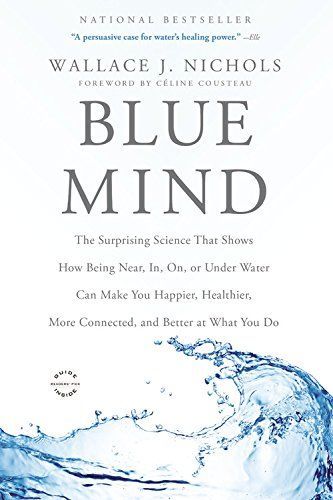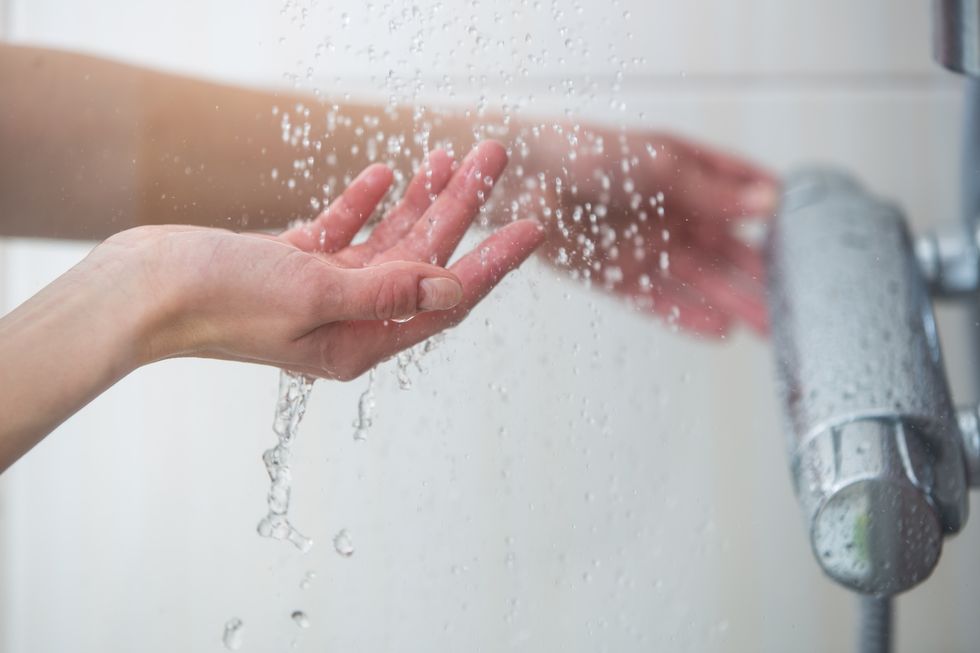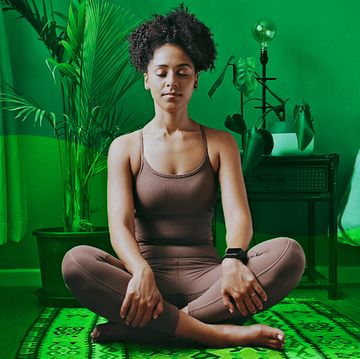Caring for our mental health is more essential than ever before. The way we treat our bodies, how and with whom we spend our time, and what thoughts take center stage in our minds are vital. In the monthly Shondaland series A Path to Well-Being, we’re sharing science and strategies to help you better understand and manage your well-being.
Picture summer, and you’re likely to think of water, whether sunbathing by a lake or ocean, swimming in a local pool or watering hole, boating on a river, or sipping ice-cold lemonade as beads of condensation drip down the glass.
If you notice your mood lifting this time of year — or even as you merely imagine these summery scenes — that’s no coincidence. Being in and around water has proven benefits for well-being.
“Our attraction to water is elemental and primal,” says San Diego-based licensed therapist Rachel Moore, who points out that humans begin their lives in water, and the body is mostly water. So is our planet. No living creature can survive without it. “We can feel this connection to water in our bodies,” she adds. “It satisfies all five senses, and that makes it really special.”
The smell of ocean air essentially tells our system to relax, as minerals like salt, magnesium, and potassium in sea air calm the physical body. The act of simply looking at water is soothing too. Studies show that seeing fountains in urban spaces, watching fish swim in an aquarium, and staring at a swimming pool for a couple of minutes increase feelings of relaxation and well-being.
Listening to water sounds — raindrops, rolling waves, running creeks — has also been shown to reduce stress hormones and ease anxiety. It can also be a relaxing soundtrack for falling asleep. Simply taking a drink of water can similarly calm anxiety, Moore says.
“If we’re even just mildly dehydrated, it can cause issues with blood pressure, heart rate, and body temperature — and if we think about it, those are some of the same types of symptoms that we get with anxiety,” Moore explains. “If you’re feeling anxious, try drinking water first.”
Actually, being in or near the aqua is even more powerful. The European Blue Health project, which conducted more than 20 studies across 18 countries from 2016 to 2020, found that the more time people spend near water, the better they feel.
Floating or swimming can evoke meditative feelings, marine biologist Wallace J. Nichols writes in Blue Mind: The Surprising Science That Shows How Being Near, In, On, or Under Water Can Make You Happier, Healthier, More Connected, and Better at What You Do. And swimming in the ocean leads to feelings of connection and transformation, according to one study.
No matter where you live or what your summer plans include, here are some ways to bring the restorative power of water into your life.
Go for a float
Float spas have emerged around the world over the years, making this type of water therapy more accessible than ever before. Known as “sensory deprivation tanks,” float tanks are more specifically private pods or tubs filled with body-temperature water and heaps of Epsom salt that make floating effortless, according to Jen Williams, owner of IntoMeSea, a wellness spa in Santa Monica, California.
The magnesium in Epsom salt relaxes the muscles while the water’s temperature blurs sensory boundaries between body, water, and air. “It turns off the proprioceptors of our brain for space,” Williams explains, “so people essentially feel like they’re floating in zero gravity.” A growing body of research shows that float tank sessions can improve sleep and help ease chronic pain, anxiety, and depression.
Most float tanks also offer the option for total darkness and silence. “The ideal, purist environment is no light, no sound, and zero gravity,” Williams says. Decreasing visual, auditory, tactile, and proprioceptive stimulation allows the brain and body to achieve a deep state of calm, she explains.
Swim with friends
Splashing around in a lake, river, or pool with pals is good for the mind, body, and soul. The calming experience of being surrounded by water, the physical stimulation of exercise, and the mood-lifting boost that comes from connecting with friends can combine to uplift your well-being.
“We know exercise helps with mental health, and community helps with mental health,” Moore says, “so you start with water, but once you start expanding, there are so many possibilities.” Water-based exercise is also good for people with arthritis, pregnant people, and older adults.
Take a plunge
Technically known as hydrotherapy, intentionally immersing the body in warm or cold water offers a host of health benefits, from reduced tension and muscle soreness to improved mood, circulation, and brain function.
A warm- or hot-water soak has been proven to reduce heart rate and blood pressure, improve circulation, relieve stress, and may help with sleep. Enjoying natural hot springs or an outdoor hot tub can enhance the effects of a liquid plunge because of the added benefit of nature.
Cold-water immersion — whether it’s a cold plunge or an ice bath — appears to reduce inflammation and help with pain control. One study found that people who finish their showers with a 30-to-90 second blast of cold water take fewer sick days.
Keep in mind that cold-water immersion isn’t for everyone. Adding a burst of cold to the end of a warm shower is generally safe. However, people with heart disease and health conditions such as Raynaud syndrome should avoid prolonged exposure to cold water.
Reset in a shower
An everyday shower is naturally relaxing. That’s why good ideas pop up while you’re in there. The overthinking mind quiets down, allowing creativity to surface. “The repetitiveness of the shower, of the water hitting your body, affects our nervous system in a really calming way,” Moore says. “Taking a bath is also helpful, similar to being in the ocean.”
You can uplevel the salubrious experience of a bath or shower with aromatherapy. Choose soap in soothing lavender or invigorating eucalyptus scents, or add a few drops of essential oil to the corner of your shower, and let the heat and steam transform your regular scrub-down into a mini spa experience. Feel healing bliss without ever leaving the house.
Sandy Cohen is a writer, health and wellness coach, and host of the Inner Peace to Go podcast. Follow her on Instagram @YouKnowSandy.
Get Shondaland directly in your inbox: SUBSCRIBE TODAY


















